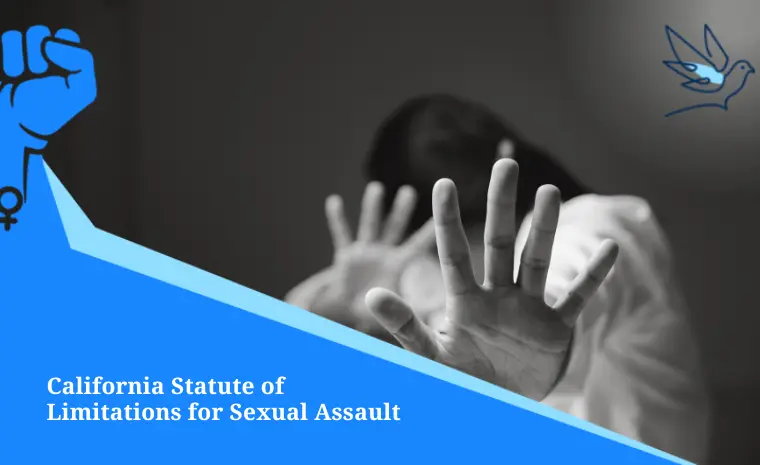California Statute of Limitations for Sexual Assault
Sexual assault is a heinous crime that causes immense physical and emotional trauma to victims. To ensure justice, legal systems around the world have established statute of limitations, which define the time within which a victim can file criminal charges against the perpetrator. The state of California has its own specific statute of limitations for sexual assault cases.
In this article, we will explore the California statute of limitations for sexual assault in detail, including the time limits, exceptions, and implications for survivors seeking legal recourse through sexual assault claims or lawsuit.
Are you or your loved one a victim of sexual abuse?
What is the Statute of Limitations?
A statute of limitations is a legal time limit within which a victim can initiate legal proceedings against an alleged offender. These time limits vary depending on the jurisdiction and the nature of the crime. Statutes of limitations aim to strike a balance between providing victims with an opportunity for justice and ensuring the fairness of the legal process.
What is Sexual Assault?
Sexual assault involves a range of actions that are intended to sexually gratify the perpetrator at the expense of the victim’s autonomy and well-being. In California, sexual assault, a type of sexual harassment, may also be referred to as “sexual battery.”
The key element of sexual assault is the absence of consent. Consent is a voluntary, informed, and mutual agreement between all parties involved in sexual activity. Without consent, any sexual contact becomes unlawful and can be classified as sexual assault.
Examples of sexual assault, as determined by California laws, include:
- Non Consensual Touching: Any intentional and unwanted touching of another person’s intimate body parts, such as genitals, breasts, or buttocks, without their consent.
- Forcible Penetration: Engaging in sexual intercourse or any form of penetration without the victim’s consent, using force, violence, threats, or intimidation. This may include sexual penetration and oral copulation.
- Sexual Coercion: Manipulating or pressuring someone into engaging in sexual acts against their will through emotional blackmail, threats, or other forms of coercion.
- Unwanted Sexual Advances: Making unwanted sexual propositions, comments, or gestures that create a hostile, intimidating, or offensive environment.
- Sexual Contact With a Minor: Engaging in any sexual activity with a person under the age of consent, even if they appear to give consent, as minors are unable to legally provide informed consent.
Understand that consent is ongoing and can be withdrawn at any time during any interaction. The absence of resistance does not imply consent. A person’s lack of ability to give consent, such as being underage, incapacitated due to intoxication, or unable to comprehend the situation, also renders any sexual activity nonconsensual and, therefore, constitutes sexual assault.

Time Limits for Different Sexual Assault Offenses
The statute of limitations for sexual assault cases depends on the nature and severity of the offense, plus the age of the victim. The state has recognized the need to provide survivors ample time to come forward and report their experiences, while also acknowledging the challenges victims face in processing trauma and gathering evidence.
The recent extensions made to California’s statute of limitations have significant implications for civil claims concerning adult sexual assault, contingent upon the specific timeframe of the assault.
Assaults that occurred on or after January 1, 2019
As per California Civil Actions Law 340.16, individuals who have experienced sexual assault are given a time frame of ten years from the date of the assault or three years from the discovery of injury caused by the assault to initiate a claim.
Assaults that occurred between January 1, 2009, and January 1, 2019
The California Assembly Bill 2777, Sexual Abuse and Cover-Up Accountability Act, became effective on January 1, 2023. This legislation introduced a three-year “lookback window” starting on January 1, 2023, and concluding on December 31, 2026. During this window, survivors are permitted to file civil claims for sexual assault that occurred between January 1, 2009, and January 1, 2019.
However, this three-year window does not apply to claims that have already undergone final court litigation or have been resolved through a settlement agreement prior to January 1, 2023.
Without this new law, survivors of sexual exploitation in California between January 1, 2009, and January 1, 2019, may have faced expiration of the statute of limitations for their civil claims. The introduction of this law allows survivors to potentially revive otherwise time-barred civil claims during the three-year lookback window.
Unsure of what to do after suffering sexual abuse?
Exceptions to the Statute of Limitations
California has recognized the need to extend the statute of limitations under certain circumstances to allow survivors to seek justice. These exceptions include:
Delayed Discovery
If a survivor discovers the sexual crime after the statute of limitations has expired, they may still have a chance to pursue legal action. In such cases, the statute of limitations begins from the date the survivor discovered, or reasonably should have discovered, the assault.
Victims Under the Age of 18
The statute of limitations for childhood sexual assault is generally extended until their 40th birthday. Within five years of discovering that any psychological injury or illness occurring after reaching adulthood was caused by the sexual assault.
DNA Evidence
If new DNA evidence emerges that can identify the perpetrator, the statute of limitations may be extended.
It’s important to consult with legal professionals to understand the specific circumstances and exceptions that may apply to individual cases.
The Impact on Survivors of Sexual Assault
The statute of limitations can significantly impact survivors of sexual assault. The trauma associated with sexual assault often prevents immediate reporting, and survivors may require time to process their experiences and seek support.
- Psychological Trauma: Survivors of sexual assault often face significant psychological trauma, which can manifest as post-traumatic stress disorder (PTSD), anxiety, depression, and other mental health challenges.
- Physical Injuries: Sexual assault can result in physical injuries, ranging from bruises and cuts to more severe injuries, such as broken bones or internal injuries. The physical impact may require medical attention, treatment, and recovery time.
- Disrupted Social and Interpersonal Relationships: Sexual assault can strain relationships with family, friends, and intimate partners. Survivors may face challenges in trusting others, forming new relationships, or maintaining existing connections due to the aftermath of the assault.
- Impact on Daily Life and Functioning: The effects of sexual assault can permeate various aspects of a survivor’s life, such as their ability to work, study, engage in social activities, and carry out daily tasks.
Seeking Justice Beyond the Statute of Limitations
While the statute of limitations for sexual assault in California sets a legal time limit, it does not diminish the validity of a survivor’s experience. It is still possible for survivors to seek justice beyond the expiration of the statute of limitations. They can share their stories, raise awareness, and support advocacy efforts for legislative changes to extend or eliminate the statute of limitations for sexual assault cases.
FAQ About Sexual Assault
Can I file a claim for sexual assault in California?
Yes, survivors of sex crimes in California have the right to file a legal claim seeking legal recourse and pursuing justice against an alleged perpetrator for the harm they have endured.
What is the statute of limitations for filing a civil lawsuit for sexual assault in California?
The statute of limitations for filing a civil lawsuit for sexual assault in California depends on various factors, including the age of the victim at the time of the assault and the date of discovery of psychological injury. It is advisable to consult with a legal professional to determine the specific time limits that apply to your case.
Are there any recent changes to the statute of limitations for sexual assault lawsuits in California?
Yes, California has implemented recent expansions to the statute of limitations, allowing survivors of sexual assault more time to file civil lawsuits, particularly in cases where psychological injury is discovered after reaching adulthood. These changes provide survivors with increased opportunities to seek legal remedies.
Can I pursue a civil lawsuit for sexual assault if the criminal case has already been resolved?
Yes, it is possible to pursue a civil lawsuit for sexual assault in California even if the criminal case has been resolved. The outcomes and processes of criminal and civil cases are distinct, and a survivor may seek compensation and other remedies through a civil lawsuit, independent of the criminal proceedings. It is best to consult with a sexual assault lawyer to better fight for your rights.
What can I expect during a civil lawsuit for sexual assault in California?
Engaging in a civil lawsuit for sexual assault in California involves a legal process that may include filing the claim, gathering evidence, engaging in negotiations or mediation, and, if necessary, proceeding to trial. It is crucial to work with a knowledgeable attorney who specializes in such cases to guide you through the process and advocate for your rights and interests.
Support for Sexual Assault Survivors
Survivors of sexual assault have access to various support services and resources in California. Organizations such as rape crisis centers, counseling services, and legal advocacy groups offer assistance to survivors in their journey towards healing and seeking justice. It is essential for survivors to know that they are not alone and that there are dedicated professionals and organizations ready to support them.
If you or someone you know has been a survivor of sex trafficking and sexual violence, take action and seek support. The Women’s Rights Group is a nationwide organization committed to assisting individuals who have experienced sexual violence in commercial settings. Our dedicated anti-trafficking services have been instrumental in helping numerous women access the necessary resources to rebuild their lives.
We can provide you with the necessary support to access medical care and legal representation throughout this challenging and intricate process. Do not hesitate to contact us at (844) 240-4967 for a confidential and complimentary consultation. You can also reach out to us through our contact form to learn more about how we can assist you.
Help and support are available. You don’t have to face this alone.






